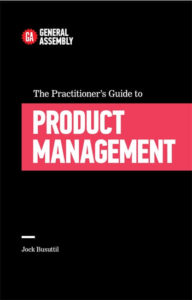
PRODUCTHEAD: Personal user manuals
PRODUCTHEAD is a regular newsletter of product management goodness,
curated by Jock Busuttil.
i product #
every PRODUCTHEAD edition is online for you to refer back to
tl;dr
Written well, personal user manuals can build psychological safety
However, they can also be abused to excuse certain counter-productive behaviours
hello
It’s become fashionable for people in tech to publish a personal user manual (aka “personal README” or “manual of me”). This can be described in different ways, but in essence it boils down to a guide for how someone would like other people to interact with them.
People who should RTFM won’t RTFM
On the one hand, I can see why this would be attractive; as someone who’s typically more introverted, I’d personally love it if I had to put in minimal effort for people to ‘get’ me. On the other hand — and I’m making some assumptions here — the kind of people whom I would most like to respect my ways of working and quirks of behaviour are also the least likely to bother to read them. Maybe I’m just too cynical. (I should put that in my personal user manual.)
I don’t want you to think I’m dismissing this idea out of hand. I do believe that it’s important for organisations to provide a psychologically safe enough working environment for people to bring their whole selves to work.
We spend so much of our lives at work that the least we can do is to make the effort to treat our colleagues with respect as real people, with all the complexity that can bring.
We abandon social contact #
I guess I’m worried about a couple of things happening. The first is almost the opposite of nobody reading each other’s user manuals: that people eschew human contact to get to know each other and only consult someone’s user manual when needed. We all still actually need to socialise in person, even if that’s daunting or emotionally taxing. (It me)

Toxic people will find new and inventive ways to be more toxic #
The other is that people start to refuse to interact with each other unless the stipulations in their personal user manual have been followed to the letter, a bit like Van Halen’s infamous rider for “no brown M&Ms”. Ken Norton, one of the featured contributors this week, describes an inflexible manager with a brittle ‘API’. It I think it goes both ways.
I still have anxiety dreams about a particular (outlier) development team I tried to work with that just built whatever the f**k they wanted, with zero interest in user needs, and notably with the tacit endorsement of their manager*. It’s therefore not a stretch for me to imagine some people using their personal user manual as a way to selectively ignore people and work they don’t like.
Then again, I’ve come to realise that people like that are going to exploit the system to be difficult no matter what I do, so I just don’t play that game any more.
So. Much. Complexity. #
I barely know what I want on a daily basis. I am far less able to codify my fluctuating temperament in a document. (I’ve no idea whether this is just me.)
Some days I crave social interaction, other days I prefer headphones, music and splendid isolation. Some days I have a high bulls**t threshold, other days I don’t.
If I struggle to know myself, is it fair to make it even harder for everyone else to interact with me just because I’ve written down all my contradictory behaviours in a user manual? I fear it would be a bit unreasonable of me.
Final thoughts #
I’m sure there will be situations where personal user manuals will be a valuable way for people to treat each other with more respect, just as there will be situations whether the reverse is true. I’m going to sit on the fence for this one and let you make up your own mind.
To help you do so, I’ve included articles this week from Ken Norton, Tom Geraghty, Elad Gil’s interview with Claire Hughes Johnson, and a link to Sian Murray Huynh’s own user manual.
Speak to you soon,
Jock
* I realise I may well have been the problem
what to think about this week
Personal user manuals
I learned a lot over the years from Urs Hölzle, Google’s eighth employee and the company’s first real engineering leader. Many of you have heard me refer to his legendary “Escalation Manifesto.” But he was also known to Googlers for his “Guide to Urs,” a document describing his leadership philosophy and communication style. It was a sort of README for working with him.
[Ken Norton / Bring the Donuts]
What is a “Personal User Manual”?
One of my favourite practices for building psychological safety is the use of personal “user manuals” (also know as README’s, manager guides and other names). These user manuals, if written well, can significantly help build psychological safety through understanding each other’s needs, behaviours, and personalities on the team. They make what is usually implicit and unknown, explicit and known.
[Tom Geraghty / Psychological Safety]
An interview with Claire Hughes Johnson
In our interview, we talk about how to manage your reports, how the org chart should be structured, and how to build functional processes that will help your company scale. We also address strategic planning and how founders should be allocating their time as the company grows.
A best practice for any founder or exec
[Elad Gil / High Growth Handbook]
Sian user manual
Inspired by some awesome Digital Gov folks on Twitter, I wrote a user manual that sums up everything you might want to know about hiring or working with me. Enjoy!
[Sian Murray Huynh / Sabot Consulting]
recent posts
How can I keep track of all these product metrics?
Hi Jock,
Do you have any advice on productivity tools for tracking product metrics? I’m seeking guidance on streamlining feedback and metrics management. Juggling continuous discovery insights, team feedback, and metric tracking has become increasingly overwhelming.
Sometimes it’s difficult to know where to start
[I Manage Products]
Getting your first job as a product manager
Job adverts present a chicken-and-egg problem: they all need you to have product management experience to secure a job, but you don’t yet have a product management job to gain that experience.
Don’t let this discourage you!
Practical tips for breaking into a career in product management
[I Manage Products]
Force multipliers
Recently I was explaining to a client why I focus my efforts on finding “force multipliers”. These are what I call activities that allow us to extract multiple benefits from a single piece of work. You could think of it a little like a workplace fusion reaction, where the output ends up far greater than the input effort.
Getting more out than you put in
[I Manage Products]
can we help you?
Product People is a product management services company. We can help you through consultancy, training and coaching. Just contact us if you need our help!
Helping people build better products, more successfully, since 2012.
PRODUCTHEAD is a newsletter for product people of all varieties, and is lovingly crafted from at least a month of typing the wrong year.


Leave a Reply